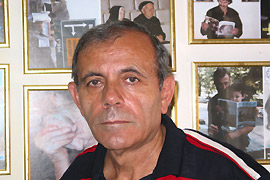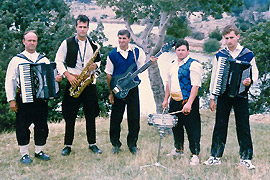"Number 17 - there was my son’s name"
31-07-2003 Feature
Cedomir Maric waited at home in Belgrade for years, hoping for news of his son who disappeared on the front line during the Balkan wars in 1995. It was only in 2001 that he received confirmation that the 21-year-old had been killed.

Cedomir Maric is president of the Family Association of Missing People from Kninska Krajina. In 1995, his son disappeared during the Balkan war.

Zeljko Maric was 21 when he disappeared without a trace. He played the saxophone in a military band.
Cedomir Maric is a technical education teacher in Belgrade. As president of the Family Association of Missing People from Kninska Krajina, he endeavours to know the whereabouts of people who disappeared during the war in this region. His own son’s death was confirmed two years ago. Now his only hope is to retrieve his body and give him a decent burial. To put an end to a traumatic chapter of his life.
Cedomir believes that the common denominator of all the families gathered around the association is hope. Not hope of a happy outcome of their search – after many painful years, few still believe that their missing relatives are alive. But rather hope that it just may be possible to find their remains. “ As time passed, the belief that I would see my son again started to wane, ” explains this 60-year-old Knin-born man who is now living in Belgrade. “ I told myself that I have to redirect my thoughts to bear on reality, so my greatest wish now is to find my son’s body and give him a decent burial, ” he adds softly. “ And believe me, I do think that those families who succeeded in doing that are happy ones .”
In its content, the story of the Marics is not very different from those of the 2,728 other families currently registered as refugees from Kninska Krajina, who are still looking for any information about their missing kin. The Marics were overjoyed when, after two daughters, a son had been born. Zeljko grew up to be a soldier and joined the army in 1995. Not on the frontline, but in a military brass band in which he played until 4 August, 1995. That day, he disappeared without a trace.
Just a musician, not even a soldier
“ I still do not understand why he did not pull out with the rest of the troops,” says Cedomir, who on that fateful day fled with his family to a safer place. “There was no need for him to stay there... what was he thinking of... I don’t know... I really don’t know .”
At first, it never occurred to the Marics that Zeljko could be dead. Their only son had to be alive, in some prison perhaps. “ He was just a musician, not even a soldier. He never harmed a fly in his life ,” whispers his father. And then a ray of hope: the International Committee of the Red Cross organized the repatriation of some prisoners of war (POWs) released from different places of detention in Croatia.
“ When the first group of POWs from Knin arrived in Belgrade by bus, I was there but I quickly realized my son was not among the passengers. I showed photographs of him to some men to see whether they knew anything about my boy. When a second group of POWs was released, I failed to find him again. I was devastated and simply cracked up. I could not go on any longer .”
“ After a while, a third and last group of POWs came in. I did not have the strength to face them. Instead of me, my brother went there. The news he brought back wasn’t good. ”
“ My wife continued to live in hope, we were hearing all sorts of stories... that there were some POWs who were digging an escape tunnel, that some Croatian families sort of adopted Serbian boys in order to save them. But I knew these were mere pipe dreams. And then, at one point, I said ‘enough.’ I wanted to put an end to self-inflicted pain and anguish. ”
Facing a painful reality
His darkest fears were finally confirmed when, as president of his association, he received a report from the Croatian Helsinki Committee. Included was a list of dead Serb soldiers with a few witness testimonies. And there, under number 17, he found his son’s name followed by an anonymous testimony confirming his death.
“ Even now, I can’t say I am absolutely sure it is true, but having in mind the number of years that have gone by and the credibility of the source, I do believe that this is genuine information. Much harder than finding out about this was the moment I had to break the bad news to my wife. ”
“ For a moment, I though it would be better if I left her to live in hope. I felt we, fathers, were somehow tougher. I waited until I had to publish the Helsinki Committee’s findings in our association’s bulletin. Without uttering a word, I put the document in front of her eyes. ”
She managed not to shed a single tear. “ She is that kind of a woman, she keeps the pain to herself, ” says Cedomir. The first time he heard her crying was last year, at the family cemetery in Knin. He then realized it was about time they started talking to each other if they wanted the wounds to heal.
“ What we’re hoping for now is that we may find his remains. We often talk about exhumations and what we will do when we get the remains, where we will bury them. And, believe it or not, talking about this makes us happy .”